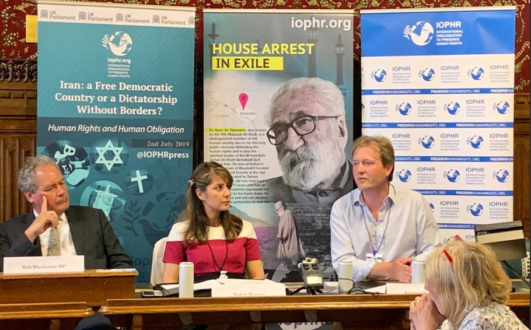chathamhouse.org – Nazanin Zaghari-Ratcliffe, a British-Iranian charity worker arrested on holiday in Iran in 2016 and jailed for five years after being found guilty of undisclosed national security charges. At the end of her term, she was sentenced to another year in prison and given a one-year travel ban after being found guilty of ‘spreading propaganda against the regime’. The United Nations and British government have both rejected the charges against her. Here, her husband tells of the dangers in not acknowledging hostage diplomacy for what it is
We are waiting. We are waiting for Nazanin to come home. We are waiting for answers as to why she hasn’t. Our family, have been waiting for years now.
The latest development came in mid-July 2021 when the Iranian ministry of foreign affairs briefed that an agreement had been made to swap 10 prisoners with the United States and Britain, saying it ‘could happen tomorrow’.
It felt as if it might almost be over. And then, just like that, it wasn’t.
This uncertainty is inherent to hostage diplomacy. The aim is to keep everyone guessing – in a paralysis of hope and fear.
Previously sunny briefings from the US state department and the British foreign secretary have gradually darkened into clear frustration.
The US Special Envoy for Iran has denounced Iran’s approach to prisoner negotiations as ‘extortion’. My conversations with the Foreign, Commonwealth and Development Office reveal an increasingly similar frustration.
For the past year, Dominic Raab, the foreign secretary, has personally engaged with negotiating for Nazanin’s release. He has spoken to Nazanin on the phone to check up on her and listened to her cry. He promised her he would do what he could.
A lot of diplomacy works through euphemism. Unfortunately, so does a lot of abuse, particularly the organized kind
Since last autumn he has been making clear his sincere expectations of an imminent breakthrough. Where initially he didn’t share our rather more jaded and sceptical outlook, gradually he has joined us.
It is a standard trajectory we have seen foreign secretaries new in post follow. They are advised to de-escalate the situation by offering a hand of friendship to secure the release of hostages, then end up becoming disheartened by the hollowness of protocol and cheap talk. Each time there has been a ministerial reset, that journey begins again.
In May, Raab reached boiling point after a series of Iranian promises were broken. He spoke out against Nazanin’s second conviction at the end of her first sentence. He described Nazanin’s treatment rightly as torture – she is the first British citizen whose torture at the hands of a foreign government has been acknowledged by our government for more than a decade.
The international community has been slow to respond to hostage diplomacy because it has been reluctant to name it for what it is. It is challenging for Britain and other like nations to label cases such as Nazanin’s for what they are – hostage-taking.
A lot of diplomacy works through euphemism. Unfortunately, so does a lot of abuse, particularly the organized kind. The failure to recognize this allows the abuse to continue.
For Iran, hostage-taking has become a diplomatic tool, even presented as an economic policy by one candidate in the country’s recent presidential election debates.
Yet up to now we have been using the wrong tools: the diplomatic instinct of describing hostages as consular cases; insisting only on raising humanitarian concerns; downplaying the abuse and advising quiescence; supporting a policy of no negotiation; being discretionary and inconsistent.
All too often we are just waiting, adopting a policy of treading water and managing the optics in the meantime.
What has long been needed with Iran and others is something coordinated and clear to challenge the business model of hostage-taking. The tools for dealing with this kind of state hostage-taking are plainly not fit for purpose.
As families, we increasingly call for legal action or sanctions, or any other kind of accountability. What we need are brave policymakers.
Unless we get them, hostage diplomacy will become like cyber-crime – something that shifted from a problem that could be quietly ignored to a matter of overwhelming importance in only a matter of years.
If we neglect hostage diplomacy by Iran, China or whoever, it will come to dominate the bandwidth of our consular services and bilateral relations.
In these cases, a couple of weeks can feel like a lifetime. We are now planning what to do if Nazanin’s detention goes beyond 2,000 days. For Gabriella, our seven-year-old daughter, waiting is the only life she has known.
The key – for families but also for governments – is not to get too wrapped up in the day-to-day ups and downs, not to be swallowed up by the roller-coaster ride. But to step back and ask – what can be done?
Until there is a real consequence for the hostage-takers these injustices will continue.
By then, Nazanin will not just be a tragedy – she will be a forewarning.
Chatham House is hosting a members’ event, ‘State sponsored hostage-taking’ chaired by Rachel Briggs on September 15.
 Shabtabnews In this dark night, I have lost my way – Arise from a corner, oh you the star of guidance.
Shabtabnews In this dark night, I have lost my way – Arise from a corner, oh you the star of guidance.



